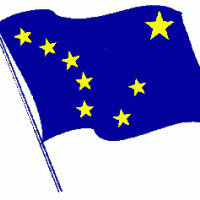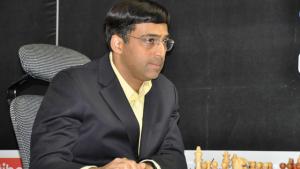
Chess in Alaska
A funny thing happened on the way back to Serbia this year. I flew in to Budapest because tickets there were cheaper than to Belgrade. After spending a night there, I got on the train south and east to Novi Sad. I went into a cabin which had two other people – one who had the novel Anna Karenina in English sitting in front of him. I thought this was a bit curious and guessed that he was probably British, since most people would not choose to read a Russian novel in English unless it was their native language.
After some hours, we reached the Serbian border. When the border control person came to the cabin, I saw that the guy had an American passport. What a coincidence, I thought – two Americans happen to end up in the same cabin on a train to Serbia. I decided to see what his story was.
“Where are you from?” I asked. “Actually,” he said, “I’m from Alaska.” This was really shocking – not only was the guy from the U.S., but he was from Alaska, where I grew up.
I thought I’d write this article about my background in chess and where I took my first steps as a chess player. Let’s just say it wasn’t exactly the vibrant chess community you might find in some places; however, there was a small number of devoted chess players. Furthermore, the fact that travelling anywhere outside of Alaska pretty much requires a very expensive plane ticket made things more difficult. Thus, tournament organizers could not expect to draw players from surrounding areas, since there basically aren’t any. Nor could I easily travel to tournaments in other cities.
It appears that a few years before I began playing chess there was much more in Anchorage; but by the time I started playing it had dwindled so that I could only play a handful of tournaments a year, and the competition was very limited as well – a small number of players, mostly rated below 1800.
I began playing around when I was thirteen. A kid on the bus taught me the rules. My first game ended when the bus hit a bump in the road and the pieces went flying. Later chess became very popular for a short time in my school. One day a flyer for a chess tournament appeared. This was the Alaska junior championship, and I surprised myself by getting third place for my age category. Some time later a flyer for another tournament arrived in my mailbox. I went to the tournament, which unexpectedly was an open tournament – not just for kids. This was my first rated tournament, and at that point I was a few months before fourteen. As a member of the U.S. Chess Federation, I received the Chess Life magazine, which at that point was covering the Kasparov-Short world championship match. The crazy games and excellent coverage really inspired me.
Some months later the year’s biggest tournament took place. This was called the “Fur Rendezvous” and took place along with the annual festival in Anchorage of the same name (although probably it was not formally connected in any way). This year it was a major event – the organizers had arranged for GM Dmitry Gurevich and some other strong players to visit, play in the tournament, and do a simultaneous exhibition. Thus I played Gurevich – naturally, since I was practically a beginner I lost easily. This was my first game against a GM, and it was in February 1994. How could I know that I would play Gurevich thirteen years later in the U.S. Championship? Our game that time ended in a draw.
I was soon very involved in chess, studying and reading many chess books. During those times computers were not a factor in chess (at least not for me, and most of the time I had no computer growing up). I did not use a database until I was 21. So I read lots of books. I played through most of the games from Tartakower’s 500 Master Games of Chess – not really critically, but rather just to see the games. I spent many hours at my desk playing through games from books. Naturally it was very dark and cold most of the year. It was also usually very windy. My house was in the mountains, and the wind tended to make strange and haunting sounds because of the geography.
I have some of the games I played, starting from probably somewhere around my third tournament. Here is one of the earliest ones I have, against a player rated around 1600. You can see that I had a pretty good grasp of how to play against an isolated queen's pawn, although I made a mistake and lost:
A year after my first tournament, I could play a decent game now and again. Such as the following one:
However, in some other games, even from the same tournament, I still played like a beginner.
Since there were very few tournaments, I played some matches. I played two matches against a fellow named Bill Anderson, one in the fall of 1994 and another in the spring of 1995. This was a guy who really loved chess and followed all of the top level games. He was one of the nicer people there. Later in 1995 I played two matches against the same player as in the game above (Doug Koch), who was rated around 1800. I won one of the matches and lost the other. Here was the decisive game of the second match, which I lost. After the game, Doug called me to tell me what I had missed near the end of the game…
In the summer of 1995, after I had been playing in tournaments for a year and a half, I was able to play for the first time outside of Alaska, when my family went to California to visit relatives. I was rated around 1500 at that time, and playing “abroad” (in the U.S. Game/60 Championship) it became clear that I was better than that, and soon raised my rating to a little under 1800. In the fall I developed some kind of opening repertoire that was very quiet compared to the one I now have. It consisted of closed positions with blockades on the light squares as black – the Stonewall Dutch and the French defense – and slow systems as white like the closed Sicilian and the London system. During that fall I looked at a lot of Rubinstein’s games, usually while playing the same two sad Pearl Jam songs on loop.
Later I was able play a few more tournaments outside of Alaska, especially in 1996. I played in the National Open, the Western States Open, and the North American open. Unfortunately, I lost the scorebook that contains my games from this time period, which still bothers me. I won some big prizes at these tournaments playing in the class sections, and thus was able to finance my trips. Being a teenager, I didn’t consider how unfair it was that I was winning large prizes while some professionals who played much better than I did went home with nothing, because they were required to play with better players than I was. Surely penalizing people for their past – good – results, and negating the work they have done is not the way to grow chess! But the system works in mysterious ways…
At this point my rating was over 2000, although I am sure I played much better than that because it was based on such few tournaments. However, some time after that I became tired of chess for a while (there weren't many possibilities for me to play interesting games anymore in Alaska), and hardly played until I went to college, where – being around many chess players and able to play many tournaments in the Baltimore area – I found Caissa again.
For me when I was growing up chess was a different thing than I found when I became part of the larger chess world. First of all, it was not very competitive for me, but rather aesthetic. I could only play rarely, and usually with much weaker players, so competition was hardly the point. Perhaps I would not make the same decision to become a chess player today.
Later, after college, I returned to Alaska for a couple years, since I could not find my way in life. My college (UMBC) had denied my graduation because of a technicality, and I could not get any kind of work to enable me to establish a life. I think those years when I again could not play cost me dearly as far as becoming a good player – I was rated over 2400 internationally, but I had no idea when I would be able to play again in serious tournaments, and those years - when you are still young - you can improve alot. Naturally, I did play in some small tournaments in Alaska, when they were held:
Many of the tournaments then and before were organized by a nice fellow named Rick Everett, who I believe since moved away. Another of the biggest organizers there was John Peters, who organized some simuls for me later, and – when I was younger – there was Caesar Lawrence, who later moved to Georgia. His constant refrain of “I see, said the blind man…” I still remember!
There is a huge difference between this background and that of some young talented players I see, who have coaches, computer training programs, parental support, play many tournaments all over, and even have sponsors. It is vital, if you want to be a good player, to have a youth in chess. When you are young, you play freely, losses do not rock the foundation of your world, you enjoy the game more, you absorb information much more easily… But I wanted to write this to inspire anyone who lives in one of the world’s remote corners and might be reading, or anyone who started chess later in life. It is possible to overcome these things, at least to some extent.






